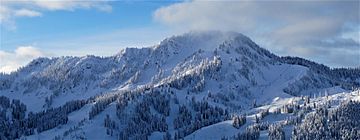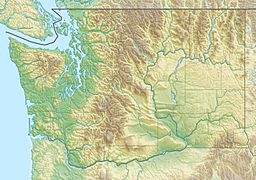Cowboy Mountain facts for kids
Quick facts for kids Cowboy Mountain |
|
|---|---|

Cowboy Mountain, north aspect
|
|
| Highest point | |
| Elevation | 5,853 ft (1,784 m) |
| Prominence | 773 ft (236 m) |
| Isolation | 1.9 mi (3.1 km) |
| Parent peak | Big Chief Mountain (5,858 ft) |
| Geography | |
| Location | King County Washington state, U.S. |
| Parent range | Chiwaukum Mountains Wenatchee Mountains Cascade Range |
| Topo map | USGS Stevens Pass |
| Climbing | |
| Easiest route | class 2 Scrambling |
Cowboy Mountain is a mountain peak in Washington state. It stands 5,853 feet (1,784 meters) tall. This mountain is located in King County, near a place called Stevens Pass. It's part of the beautiful Cascade Range. Many people know Cowboy Mountain because of the ski runs on its northern side. These slopes are part of the Stevens Pass Ski Area, a popular spot for winter sports.
Contents
About Cowboy Mountain
Cowboy Mountain is managed by the Mount Baker-Snoqualmie National Forest. It is part of the Chiwaukum Mountains. These mountains are a smaller group within the larger Cascade Range.
Mountain Neighbors and Trails
Cowboy Mountain's closest taller neighbor is Big Chief Mountain. Big Chief Mountain is about 1.9 miles (3.1 km) to the northeast. The famous Pacific Crest Trail passes right between these two mountains. This trail is a very long hiking path that stretches across the western United States.
Water from Cowboy Mountain flows into the Tye River. The Tye River then flows into the Skykomish River.
The Cascade Tunnel
A very important railroad tunnel, the Cascade Tunnel, runs directly under Cowboy Mountain. This tunnel is the longest railroad tunnel in the United States. It was built to help trains avoid dangerous avalanches. These avalanches often threatened the trains of the Great Northern Railway.
Not far from Cowboy Mountain, a very sad event happened. The 1910 Wellington avalanche occurred about two miles west of the mountain. This was a very large avalanche in United States history.
Weather and Climate
Cowboy Mountain is in a marine west coast climate zone. This means it gets a lot of moisture from the Pacific Ocean. Most weather systems come from the Pacific and move towards the Cascade Range.
How Mountains Affect Weather
When these weather systems hit the tall Cascade Mountains, they are forced to rise. As the air rises, it cools down. This causes the moisture in the air to turn into rain or snow. This process is called Orographic lift. Because of this, the western side of the Cascades gets a lot of rain and snow. Winter months see especially heavy snowfall.
Seasonal Weather
During winter, the weather is usually cloudy. However, in summer, high-pressure systems form over the Pacific Ocean. These systems often bring clear skies and sunshine. Because of the ocean's influence, the snow on Cowboy Mountain tends to be wet and heavy. This type of snow can increase the risk of avalanches.
 | Mary Eliza Mahoney |
 | Susie King Taylor |
 | Ida Gray |
 | Eliza Ann Grier |



